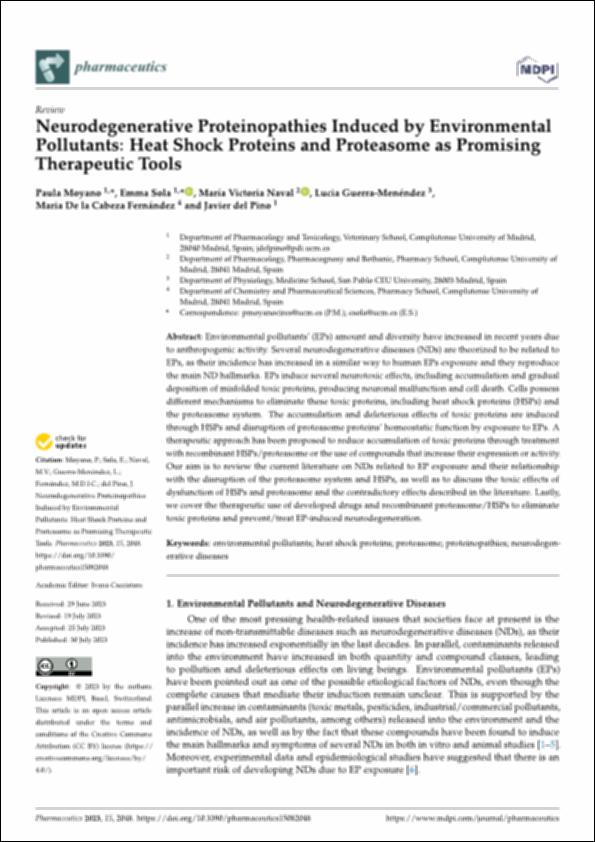Por favor, use este identificador para citar o enlazar este ítem:
http://hdl.handle.net/10637/14991Neurodegenerative Proteinopathies Induced by Environmental Pollutants: Heat Shock Proteins and Proteasome as Promising Therapeutic Tools
| Título : | Neurodegenerative Proteinopathies Induced by Environmental Pollutants: Heat Shock Proteins and Proteasome as Promising Therapeutic Tools |
| Autor : | Moyano, Paula Sola, Emma Naval, Victoria Guerra Menéndez, Lucía Cabeza Fernández, María de la Pino, Javier del |
| Materias: | Environmental Pollutants; Heat Shock Proteins; Proteasome; Proteinopathies; Neurodegenerative Diseases |
| Editorial : | MDPI |
| Citación : | Moyano, P.; Sola, E.; Naval, M.V.; Guerra-Menéndez, L.; Fernández, M.D.l.C.; del Pino, J. Neurodegenerative Proteinopathies Induced by Environmental Pollutants: Heat Shock Proteins and Proteasome as Promising Therapeutic Tools. Pharmaceutics 2023, 15, 2048. https://doi.org/10.3390/ pharmaceutics15082048 |
| Resumen : | Environmental pollutants’ (EPs) amount and diversity have increased in recent years due to anthropogenic activity. Several neurodegenerative diseases (NDs) are theorized to be related to EPs, as their incidence has increased in a similar way to human EPs exposure and they reproduce the main ND hallmarks. EPs induce several neurotoxic effects, including accumulation and gradual deposition of misfolded toxic proteins, producing neuronal malfunction and cell death. Cells possess different mechanisms to eliminate these toxic proteins, including heat shock proteins (HSPs) and the proteasome system. The accumulation and deleterious effects of toxic proteins are induced through HSPs and disruption of proteasome proteins’ homeostatic function by exposure to EPs. A therapeutic approach has been proposed to reduce accumulation of toxic proteins through treatment with recombinant HSPs/proteasome or the use of compounds that increase their expression or activity. Our aim is to review the current literature on NDs related to EP exposure and their relationship with the disruption of the proteasome system and HSPs, as well as to discuss the toxic effects of dysfunction of HSPs and proteasome and the contradictory effects described in the literature. Lastly, we cover the therapeutic use of developed drugs and recombinant proteasome/HSPs to eliminate toxic proteins and prevent/treat EP-induced neurodegeneration. |
| URI : | http://hdl.handle.net/10637/14991 |
| Derechos: | http://creativecommons.org/licenses/by-nc-nd/4.0/deed.es OpenAccess |
| ISSN : | 1999-4923 |
| Fecha de publicación : | 30-jul-2023 |
| Centro : | Universidad San Pablo-CEU |
| Aparece en las colecciones: | Medicina |
Los ítems de DSpace están protegidos por copyright, con todos los derechos reservados, a menos que se indique lo contrario.


